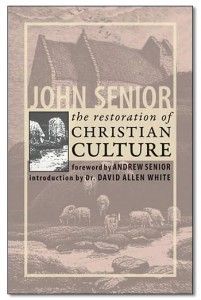From the Highlighter: John Senior

The Restoration of Christian Culture
Well, whatta drag. This post was up all day, then I went to make some changes and the whole thing got deleted. I'm just cutting-and-pasting an unedited version of the one that had been up:
I owe this modern classic to Gilbert Magazine. It was about eight years ago. I'd just started contributed pieces to the magazine and pretty much read every issue front-to-back. One month the editors reached to 1983 retro-reviewed what is either the most quixotic book ever written or the brightest ray of hope to spring from twentieth-century America. No matter what the ultimate verdict (25 years later, I'm inclined to say it's radically quixotic), it is one of the most beautiful non-fictional works ever.
Senior taught at the University of Kansas and was the founder of the Integrated Humanities Program. I remember reading awhile back that UK disbanded the program after complaints from parents: their children were converting to Catholicism under Senior's influence and (oh the horror!) becoming priests and, horrors of horrors, nuns and, rocky horror of horrors, monks. I don't remember where I read it and don't even know whether my memory is correct, but it rings true: No secular university could stomach the metaphysically-laced teachings of a man like Senior. Better to keep such men in survey courses, or else people will start thinking they're more than money-making machines. What would happen to our economy then?
Page references below come from the Roman Catholic Books edition.
The Passages
Christians in general would profit from this book, but it is unabashedly Catholic. From the seventh page: “What is Christian culture? It is essentially the Mass?” I suspect Protestants would read that, vomit, then log onto the seller's page at eBay. I even have a hard time getting my head around it, but if you get back to the basics–from Christ's institution of the Eucharist down through Christendom's zenith during the High Middle Ages–you see the Mass everywhere.
__________
“We must inscribe this first law of Christian economics on our hearts: the purpose of work is not profit but prayer, and the first law of Christian ethics: that we live for him not ourselves.” p. 16. As I've increasingly fallen into the profit mode of living (comforted by the words attributed to Samuel Johnson: “A man is seldom more innocently occupied than in getting money”), words like this should haunt me, but they don't (not much, anyway). Senior's observation applies to any activity. He directed his observations to a money-obsessed culture, but if we were a culture of play, he would've said, the first law of relaxation is prayer. If the understanding of life-as-prayer leavens every activity, every activity is enhanced. I feel highly comfortable working intently for long hours, knowing I am merely riding the station God has provided. At times, I work too intently and forget the life-as-prayer part. That's when the troubles–the obsessing, the flairs of anger, the greed–kicks in. If you keep the work-as-prayer attitude, nothing is too much.
__________
“the King of Music, Oberon . . .”. I didn't know my favorite beer was named after a Shakespeare character. I think this might qualify as an instance of what Henry Adams called “accidental education.” http://oberon-device.com/#oberon
__________
“what you read enters directly into the intelligence.” p. 25. Other influences like music and art enter indirectly. All are important, but good reading, especially for youth, is especially important. I wish I hadn't spent all that time with comic books as a kid.
__________
“smash the television.” p. 26. Okay. I still have four left. But the point is well-taken. I smash the television figuratively every day by insulting it in front of my children. I usually say something like, “It's an amazing entertainment device: so much fun for such little cost. It's like a drug, and drugs ought to be enjoyed sparingly.”
Aside: I have no tolerance for people who “use” TV for education. That's like drinking alcohol for the medicinal qualities. A true abuse. Don't kid yourself about TV: it's a time whore and a waste. That being said, enjoy it, but be aware.
Second aside: If you insist on using TV for education, merely order the transcript from the Discovery Channel show you're going to watch. You can read it in five minutes, thereby saving yourself 55 minutes.
__________
“picking out similarities and differences [is a] skill which Aristotle says is a chief sign of intelligence.” p. 27. Did I mention that, along the conservative spectrum, this book is similar Russell Kirk and highly different than everything the neo-cons write? Did I mention this book is similar to . . .
__________
“the seminal ideas of Plato, Aristotle, St. Augustine, St. Thomas, only properly grow in an imaginative ground saturated with fables fairy tales, stories, rhymes, romances, adventures–the thousand good books of Grimm, Andersen, Stevenson, Dickens, Scott, Dumas and the rest.” p. 30. Sigh. I tried with my children, but Harry Potter, animorphs, and other post-moderns beat me.
__________
On letting your children grow up and mature and maybe even get into a little bit of trouble: “There is little point in keeping children out of Hell if you don't afford them the means of getting into Heaven.” p. 41.
__________
“All philosophy, said Socrates, is 'a meditation on death.'” p. 46 (also: p. 90). What is the point of studying one's life and then losing it?
__________
“technology is the inevitable consequence of Epicureanism; it is the dedication of our lives to the pursuit of happiness defined as pleasure . . .”. p. 53. Strikes me a little harsh, but with a loud ring of truth to it.
__________
“If we discovered paradise, some real estate operator would subdivide it into building lots and in a year reproduce Los Angeles.” p. 56. Need proof? Go to Jackson, Wyoming, which was just a little mountain village when Senior wrote those words.
